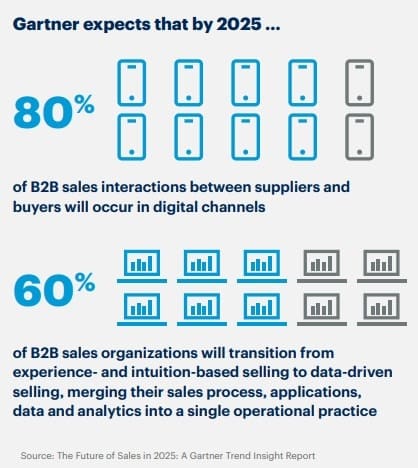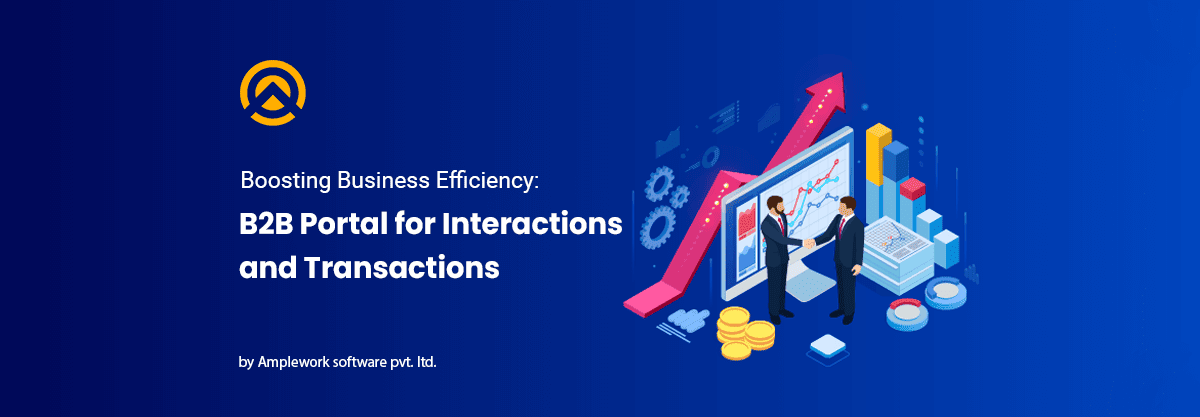Today’s world is all about becoming technically advanced and adopting new solutions. Which are essential for the overall growth on a global scale. In this highly advanced technical era, these growth aspects are effective communication, efficiency, and cost-effectiveness. From traditional times, businesses have been formed in two ways such as business-to-customer (B2C) and business-to-business (B2B). which are expanding and making the market grow for many years. The formation of business-to-business services is gaining more market recognition with the addition of different technology-aided solutions.
The development of B2B web portals has become easy and acceptable for different requirements. This is nothing but a one-stop online where the clients, vendors, and partners can access business-related details. Which are product-related information, organizational services, website content, and transactions. With all these innovative advancements the traditional business process was redefined and offered a seamless bridge between organizations on a global scale. In this context, the research data from Gartner Future of Sales Report 2020 highlights similar aspects.
 Source: Gartner Future of Sales
Source: Gartner Future of Sales
As shown in the above figure, the research expectation by Gartner is that 80% of the B2B sales interactions between buyers and sellers will occur in digital channels or mediums. The sales transformation will take place in the B2B organization from experience and intuition-based selling to data-driven selling having a conversion rate of 60%. This shows the expanding market needs that are heading toward digital transformation.
This blog presents the major factors of B2B digital transformation and portal development. The major highlights of this are the benefits of these web portals and the implementing ways of these platforms. Any business organization or individual looking for adequate information about these B2B portals. This blog can be a proper source to satisfy their needs.
Benefits of Developing B2B Web Portals
 Benefits of Developing B2B Web Portals
Benefits of Developing B2B Web Portals
In any industry, business-to-business web portals offer a robust online platform that empowers companies to enhance their business operations significantly. These portals excel at simplifying communication channels, optimizing ordering procedures, and automating sales and service functions, ultimately rendering daily interactions seamless and highly efficient. By deploying an aptly designed B2B web portal, organizations can achieve various benefits. Here are several advantages that accompany the implementation of a B2B web portal:
1. Enhanced Communication
One of the primary advantages of B2B portal development is the ability to streamline communication between businesses. These digital platforms serve as a centralized hub where partners, suppliers, and customers can easily interact, exchange information, and collaborate in real-time. Gone are the days of endless email threads and cumbersome paperwork; B2B portals simplify communication, making it more efficient and effective.
2. Better Decision Making
B2B portals open the gateway to a treasure trove of invaluable data and analytics, placing the power of data-driven decision-making in the hands of businesses. These platforms offer intricate insights into customer behavior, real-time inventory levels, and comprehensive transaction histories. Armed with this wealth of information, companies can fine-tune their strategies, swiftly adapt to evolving market dynamics, and pinpoint emerging growth opportunities. The ability to harness data in this way is a strategic advantage, allowing businesses to stay ahead of the curve and proactively respond to industry shifts. B2B portals transform data into actionable knowledge, enabling organizations to steer their course with precision and agility.
3. Reduced Cost
Cost-effectiveness is a critical factor for businesses striving to remain competitive. B2B portals contribute to cost reduction in several ways. By automating processes, they minimize labor costs. Additionally, they reduce the need for physical paperwork and documentation, saving on materials and storage space. Furthermore, streamlined communication and efficient workflows result in faster decision-making, which can translate into cost savings.
4. Improved Data Security
B2B portals are fortified with robust security features, providing an impenetrable shield around your sensitive business data. These platforms employ secure authentication processes, stringent access controls, and state-of-the-art encryption techniques, effectively mitigating the risk of data breaches. This enhanced data security serves as a fortress, protecting your valuable information from potential threats. Moreover, it plays a pivotal role in fostering trust, both within your organization and with external stakeholders. Partners and customers can confidently engage with your business, knowing that their data is safeguarded, enhancing relationships, and solidifying your reputation as a trustworthy and secure business partner.
5. Enhanced Customer Experience
B2B portals can be thoughtfully crafted to offer a user-friendly interface tailored for your valued partners and customers. This user-centric design approach brings about a transformative improvement in the overall experience, simplifying navigation and facilitating access to vital information. The result is a seamless and intuitive platform that effortlessly caters to the needs of stakeholders, enhancing their satisfaction and fostering lasting loyalty. With a user-friendly B2B portal, you empower your partners and customers to efficiently interact with your business, ensuring they have a positive and convenient experience every step of the way, ultimately strengthening the bonds of trust and loyalty that are essential in B2B relationships.
6. Global Expansion and Reach
B2B portals act as catalysts for global business interactions and transactions, effectively dismantling geographical constraints that may have hindered international engagement. These platforms serve as a bridge that connects businesses with partners and customers across the world, erasing the boundaries of distance. This expanded global reach not only broadens horizons but also paves the way for entry into new markets and revenue streams. Businesses can seize the opportunity to diversify their offerings, adapt to varying market demands, and cultivate international relationships. B2B portals, in essence, become the gateway to a world of opportunities, enabling organizations to explore, grow, and thrive on a global scale.
7. Efficient Resources
Efficiency is the lifeblood of any successful business, and B2B portals excel in this regard. They enable businesses to automate various processes, reducing manual labor and the risk of errors. Whether it’s order processing, inventory management, or data exchange, B2B portals optimize workflows, ensuring that tasks are completed faster and with greater precision.
8. Scalability and Flexibility
B2B portals are inherently designed with scalability and adaptability in mind, serving as dynamic platforms that evolve alongside your business. As your company experiences growth or takes a new strategic direction, these portals can be seamlessly customized and expanded to meet the evolving requirements. This inherent flexibility safeguards the continuity of your digital infrastructure, ensuring it can keep pace with your organization’s development. Whether you’re expanding your product line, targeting new markets, or adjusting operational workflows, B2B portals readily adjust to your changing needs. This adaptability provides a stable foundation upon which your business can confidently build and innovate, without limitations tied to your digital infrastructure.
9. Market Competitive Advantages
By embracing B2B portal development, businesses can secure a competitive edge, reaping benefits that extend beyond mere efficiency. These dynamic platforms enhance cost-effectiveness, reduce overheads, and bolster customer relations, setting companies apart from rivals. Efficiency and cost savings position businesses as lean and agile players in their respective industries. The user-centric design of B2B portals further improves customer relations, attracting and retaining clients. The cumulative effect is that of a prominent industry leader, not only surviving but thriving and influencing the field. B2B portals are the key to elevating businesses to industry prominence, combining operational excellence with enhanced customer satisfaction.
Read more: Best ways to speed up your mobile app development process
Implementing Ways of B2B Portal Development
 B2B Portal Development
B2B Portal Development
The development process is now becoming more advanced and providing many value-added services. B2B web application development is considered one of the most demanded services in the current times. To get the effective result of desired requirements different implementing practices are followed. These are as mentioned further.
Designing
Designing a B2B web portal transcends typical consumer websites, demanding a holistic approach where digital strategy aligns with business objectives. It begins with goal-setting, and understanding the portal’s purpose, be it for customer support, partner relations, or education. Key features include responsive design, streamlined search, content customization, detailed product info, secure sign-in, dynamic pricing, robust customer support, and seamless external integration. A user-centric approach curates content for quick, intuitive access. Accessibility via various devices is crucial. These elements collectively shape a web portal application development that effectively meets business goals and user expectations, elevating efficiency and customer satisfaction.
Building
Constructing a B2B web portal involves balancing customer and supplier needs to provide an efficient and user-friendly experience. The process begins with infrastructure setup, focusing on security features, scalability, open APIs for system integration, and global accessibility. Analytics capabilities are integrated to track core processes and engage with insights into buyer behavior and supplier ratings. Effective promotion through email campaigns, sponsored content, case studies, webinars, and group demos is essential. Maintaining the platform’s relevance over time is vital; regular feedback reviews, updates, modern interfaces, and automated processes ensure ongoing value and customer retention, enriching the B2B experience.
Integrating
Integrating a B2B (Business-to-Business) web portal into a business brings a host of compelling benefits. It accelerates customer access to vital information while elevating customer support, resulting in heightened satisfaction. Automation simplifies transactions, making them faster and more user-friendly. This efficiency reduces administrative costs, yielding long-term financial savings. Additionally, B2B platforms offer enhanced security standards and robust analytics tools for in-depth data analysis and valuable customer insights. To ensure successful integration, businesses must establish data protection protocols, advance authentication processes, utilize efficient website performance tracking tools, employ SEO strategies for visibility, enable eCommerce capabilities, and integrate CRM platforms with relevant analytics tools. By streamlining user experiences with immediate access to essential account data and intuitive navigation, a B2B web portal enhances overall buyer interactions.
Optimizing
Optimizing a B2B web portal requires a systematic approach to success. Begin by establishing the portal’s purpose, understanding its user base, and identifying tasks users will perform. Research existing solutions in the market for enhancement opportunities. Consider user interactions, addressing design, navigation, content structure, and integration of features like SEO. Explore e-commerce capabilities, CRM integrations, and third-party compatibility. Testing is crucial before launch to ensure functionality and gather feedback. This comprehensive approach ensures alignment with business goals and an intuitive user experience, enabling companies to deliver exceptional results.
Maintenance
B2B web portals optimize business interactions with tailored solutions in which they can opt for software maintenance and support services. Ongoing maintenance ensures seamless functionality, cost reduction, and customer satisfaction. These portals streamline operations, expedite transactions, and enhance global reach. Challenges include user-friendly design, security, and personalization, demanding technology integration. Effective portal design incorporates responsive features, efficient search, and seamless integration. Creative promotion is key, supported by regular feedback and updates. Integration reduces costs and improves security, with data protection and advanced authentication. Optimization ensures efficiency and accessibility.
Read more: 11 Top Web Application Security Best Practices for Your Business
Conclusive Outlines
In the realm of B2B Portal Development, a revolution is underway, bringing forth cost-effective B2B software solutions tailored to diverse markets and streamlining business interactions and transactions. As the demand for these efficient platforms continues to surge, a notable increase in the number of B2B portal developers and specialized organizations is evident. In stark contrast to the challenges often associated with early stages, numerous startup portals have successfully carved a positive reputation. Today, startups predominantly optimize their products using this approach, catering to the ever-evolving needs of businesses in the B2B sphere.
Amplework proudly stands out as a reputable company, boasting over 5+ years of extensive experience in B2B Portal Development. Our team consistently exceeds client expectations, having completed numerous development projects. Our unwavering commitment to reliability and trustworthiness has translated into a remarkable milestone, with our solutions facilitating seamless business interactions and transactions. Explore our website to discover the exceptional B2B portal development services we provide. Partner with Amplework to harness the potential of state-of-the-art B2B portal development, simplifying your business interactions and transactions for growth and prosperity.










